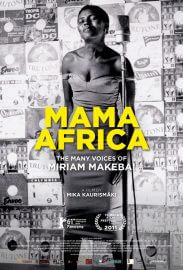
https://www.filmplatform.net/product/mama-africa
Miriam Makeba was the first black African musician who won international stardom and whose music was always anchored in her traditional South African roots.
Forced into exile in 1959, she sang for John F. Kennedy, performed with Harry Belafonte and Nina Simone, was married to Hugh Masekela and also Stokely Carmichael. She always stood for truth and justice. She fought for the oppressed most importantly for Black Africans, as a campaigner against Apartheid. She died November 2008 after a concert in Italy. Mika Kaurismäki’s documentary, traces fifty years of her music and her performing life.

I’m old enough to remember Miriam Makeba and her songs from the 60s, I remember how exceptional her voice and performance in songs like Pata Pata, Malaika, The Click Song, Forbidden Games etc. was for me, growing up in northern and isolated Finland, something completely new. Her music opened my eyes and ears to Africa, at that point an artistically unknown continent for me.
In the last ten years I’ve made three documentaries about music: ”Moro no Brasil” (2002), ”Brasileirinho” (2005) and ”Sonic Mirror” (2007). In fact, they’re not only about music; all the films have a very strong social aspect, too. I’ve tried to show how music can be a strong and positive force in the lives of human beings and how people who perform music also send a certain social message.
In this regard, ”Mama Africa” about Miriam Makeba (1932-2008), is a very natural and logical continuation to my previous work. Miriam Makeba and her life is probably one of the strongest examples of how art can be used in the service of a social and political purpose and vice versa. Her art always had a very strong message; during a long enforced exile from her native country she became an endeared symbol in the fight for racial equality.
When we started the project, Miriam Makeba was still alive, but then on the morning of November 10th, 2008, I got a phone call informing me that she had passed on. It was a shock of course. At first I thought this is it, the film won’t be made but after discussions with my co-producers and other people involved we decided to move on and make the film. We thought that now it was even more important than before. Of course, the whole concept changed as she wasn’t there anymore. Now we had to rely more on archive footage and statements from her grandchildren, friends and colleagues in order to draw a bigger picture of her and her extraordinary life.
The film approaches Miriam Makeba from different angles; Miriam Makeba as an artist, activist, mother, grandmother and – a human being. Besides this, her own life struggle reflects the struggle of her motherland, South Africa, from apartheid to democracy. Even if exiled, she witnessed it all very closely, and this is one of the film’s undertones.
Miriam Makeba left a big legacy behind, not only in South Africa but throughout the world, her unique melodic voice became the voice of freedom and dignity for her people, both old and young. However, the film will not only tell the history of Miriam Makeba, but also show South Africa’s present day by introducing younger artists, who were born, when Mama Africa was still in exile and banned, but who were inspired by her and her art nevertheless.